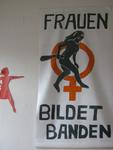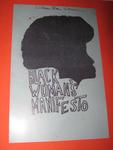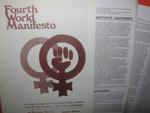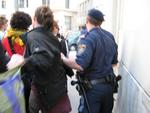Media and Gender Politics at the Autonomous Womyn's Gathering, Vienna
type=blog
"Smash, smash, smash all the nations
We are the feminist generation
We mess up military bases
We destroy fascist nations
Bombs, Guns and Evolution
We're gonna make a Revolution
We wanna start an insurrection
We wanna find a new direction"
- Protest song at the Autonomous Womyn's Gathering, Wien
Back in April, I went along to the Autonomous Feminist Womyn's Gathering in Vienna. As part of the GF project, I led a workshop on zine making. On a beautifully sunny day, a bunch of us huddled around on picnic benches outside the FrauenLesbenMädchenZentrum, chatted, made art and writing, and collaborated on producing a zine together.
The gathering itself was pretty amazing. Completely self-organized, a small group of volunteers, inspired by the inaugral fest in Germany a year previously, worked together to create a week long gathering full of workshops, discussions, street actions, films, meetings, and socials, with a radical-feminist, pan-European bent.
However, this event was for cis-gendered women and lesbians only, as shaped by the bio-womyn only policies of the FrauenLesbenMädchenZentrum venue. This exclusion wasn't made specific on the promotion materials (i.e. only bio-women), but implied through the radical feminist use of the word 'womyn'. Discussions by participants happened at the end of the week to raise awareness of trans-issues and to question the exclusivity of the event. I left unclear on whether future autnomous womyn's gatherings, if they were held at venues that had no bio-women only policies, would be trans-inclusive, or if future organizers would be interested in working in coalition with trans groups and individuals. [There is a report from a participant at the gathering, and her desire for bio-women only spaces, here http://charlielittle.wordpress.com/2009/05/16/report-of-autonomous-womyn.... For more discussions about spaces and trans-exclusion/inclusion, please check out the zine "Trans-Feminism" free to download from the zine archive on this site.]
The gathering brought together around 250 women from 30 different countries. In the final session, which was an evaluation of the event, heated discussions arose around media politics. Some passionately different viewpoints about visibility emerged: some women believed that no photos showing women's faces should be published from the event and that having an email message list/sending photos over the internet was insecure. The rationale for this argument was that women's security, especially those engaged in radical politics, should be paramount. Others argued that visibility of the event was important too, such as making a documentary or zine to chronicle the event and to gather women's impressions from the gathering. There were mummurings about taking this so-called 'security' too far, and that the state/anti-feminists just aren't that interested. This wasn't worked out at the session, and one women walked out from the discussions/arguments in protest.
These discussions raise important questions, especially when putting radical information into the public sphere (such as the zine archive on this site). Social movements would benefit from re-considering how they shape the broadcasts from their movements. Within zines this seems very critical, because of all the personal writing within them. Zine makers would benefit from thinking about what personal information- in terms of full names and addresses- are included in their publications. The internet also makes people easily traceable.
In publishing the photos from the gathering, I've chosen to respect the discussions about security and have posted images in which individuals are not identified. The zine from the workshop has also been scanned in and published, as was agreed at the workshop.
Some questions remain: how do we broadcast information, and chronicle our histories, in ways which are secure and accountable to our social movements? When articles are published in zines, for example, how far should these be considered as materials made freely available in the public sphere, and okay to be reproduced? Surely some ethics of dissemination, especially in terms of personal information and identification, need to be laid down? Asides from researchers, perhaps authors and media makers also need to think about taking up pseudonyms or first names only, in order to better protect themselves?
As someone who is interested in feminist history, it also seems important to think about chronicling grassroots feminist action. With new technologies, for me this mostly takes the format of photos, audio recordings, and blogging. When registering for the gathering I enquired about recording sessions and was told this wasn't appropriate- which I completely agreed (not least because having a mic hanging around inhibits speech). What is the balance between recording information and embracing the ephemerality of discussion and debate?
At the Lesbian Lives conference in 2008, myself and my partner recorded the key note addresses from Kate Bornstein and Barbara Carrellas. This format, as a lecture, was appropriate. We got the blessings of the speakers. This recording was then turned into a CD by the ladies from the Dublin magazine Rag and distributed for free with their publication under the title "Dangerous Dreams and Damned Desires".
What is important to chronicle from an event? For example, to aid more feminist organizing it seems like some overview of how to put on an event would be useful, as well as a summary of the evaluation/feedback comments (in order to learn from the shortcomings as well as the successes of our events). What is the balance between chronicling for our movement, and chronicling to inform people who are on the fringes of feminist and political activism? (for example, this has long been a concern of feminist publications, especially in the Women's Liberation Movement). How can we make documentation and media broadcasting more democratic, so that this work is spread out over the participants and doesn't just fall back to the organizers of events? What is the role of 'branding' and new media technologies in contemporary grassroots feminist movements?
One of my biggest bugbears of feminism and other social movements, is that the traces of its events and interventions can often be lost to time. Also the wealth of experience in actually organizing events may end with the organizers themselves, thus each new generation or group having to start from scratch again.
Thinking of the media politics of feminism, from the grassroots, there are many questions to raise about broadcasting, dissemination, sharing work loads, maintaining the privacy and safety of agitators, and for feminist messages and methods to continue to spill out into the community, to be picked up by the largest range of people as possible. In this regard, I think feminism could learn alot from the media practices of IndyMedia and the mobile information points often found at big protests- where computers and equipment are accessible for protestors to document their own stories and critiques. I guess this also leads to interesting questions about the difference between alternative media and autonomous media- if the former means presenting stories and experiences often ignored and marginalized by the mainstream, and the latter referring to the means of encouraging and allowing people on the margins of media representation to represent themselves.
In this vein, just a shout out about the GF website project. If you have a project, publication, interview, resources or whatever you would like to share, please register for a password for the site and then feel free to upload your materials. Also, there is the option to create your own blog on this site too. This site is geared towards participatory media and culture making. Please know that this is a resource for you to use to promote feminism and social change initiatives in your country and region, to be read by a transnational audience. We hope the site will act as a hub linking together disparate feminists, researchers, activists, agitators, and interested folks.
The workshop zine is available to read below. The photos are from an exhibition on women's liberation materials curated by the Stichwort archive and a street demo with a kiss-in.
- redchidgey's blog
- Login or register to post comments










